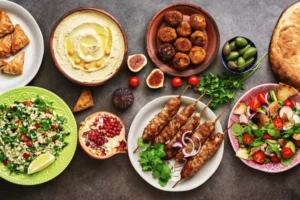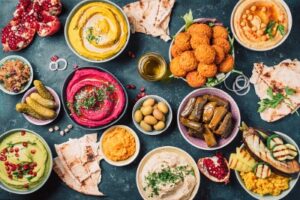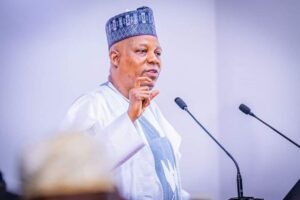As Nigeria intensifies its economic diversification drive, a quiet revolution is emerging — one rooted not in oil or mining, but in faith, ethics, health, and global trade confidence. The newly introduced National Halal Economy Strategy positions Nigeria to enter a trillion-dollar global market while also addressing one of the nation’s most pressing crises: deteriorating public health.

This is not a religious project. It is an economic modernization and public health blueprint — a way to attract investment, boost exports, rebuild trust in food and manufacturing systems, and promote safer, healthier living for Nigerians. In the same way that Islamic banking became a mainstream development tool, Halal certification can now do the same for Nigeria’s trade and health security.
The Global Halal Boom
Globally, the Halal economy is valued at over $3.2 trillion annually, spanning food, pharmaceuticals, cosmetics, finance, fashion, logistics, and tourism.

According to the State of the Global Islamic Economy Report (2023), Muslim consumers alone spent $2.4 trillion on Halal-certified products and services, projected to reach $3.5 trillion by 2030.
Countries like Malaysia, Indonesia, and the United Arab Emirates have built entire export ecosystems around Halal.
Malaysia’s Halal industry contributes over 7% of GDP and employs hundreds of thousands.
Indonesia’s Halal Product Assurance Law (2019) attracted billions in investment, making it a global Halal manufacturing hub.
Nigeria — Africa’s largest economy and home to over 100 million Muslims — now stands at this same threshold, with a growing non-Muslim population increasingly choosing Halal products for their quality, traceability, and safety.
Nigeria’s Strategic Entry
The Tinubu administration’s Halal Economy Initiative offers a bold pathway to expand non-oil exports, create jobs, and attract ethical global investors. Through NAFDAC, NESREA, SON, and NEPC, the initiative aims to standardize certification, strengthen traceability, and open export corridors to Asia, the Middle East, and Europe.

Key Opportunities
Halal Food & Agriculture: livestock, poultry, beverages, spices, and processed foods
Pharmaceuticals & Healthcare: Halal-certified drugs, nutraceuticals, and cosmetics
Finance & Logistics: Islamic banking, insurance, and compliant supply chains
Tourism & Hospitality: Halal-friendly hotels, airlines, and medical tourism
For ordinary Nigerians, the benefits are tangible — better food quality, higher incomes for farmers, cleaner production systems, and thousands of new jobs.
Halal, Health, and the GMO Debate
Fifty years ago, diseases such as cancer, kidney failure, and heart disease were far less common in Nigeria. Today, these illnesses are rising sharply — not just because of genetics or lifestyle, but due to the declining quality of food.

From pesticide residues to chemical preservatives and genetically modified ingredients, many foods sold today have no consistent safety oversight.
This is where the Halal economy offers a transformative alternative.
Halal certification enforces strict standards of purity, traceability, and safety — ensuring that food is not only lawful but also wholesome and beneficial (“tayyib”). Research shows that people consuming Halal-certified products enjoy better health outcomes, thanks to the avoidance of harmful additives, contaminants, and unethical sources.

Unlike GMOs, which often lack long-term safety data, Halal certification demands full transparency. If a GMO involves forbidden genetic material (e.g., from pigs) or lacks verified safety, it is rejected. Countries like Malaysia and Indonesia already require complete GMO disclosure under their Halal standards — protecting both local consumers and export reputations.
By applying these same principles, Nigeria could redefine food safety.
A coordinated national Halal certification system under NAFDAC, SON, and NESREA would:
Ensure scientifically verified, ethically sourced food products.
Promote organic and pesticide-free farming.
Rebuild consumer trust and enhance export credibility.

In short, Halal can become Nigeria’s national seal of food integrity — a benchmark for both trade and health.
Global Lessons Nigeria Can Learn
1. Malaysia: Built the world’s most trusted Halal certification (JAKIM), merging faith, science, and technology — now worth billions in exports.
2. Indonesia: Integrated Halal into SME development and industrial strategy through its BPJPH.
3. Saudi Arabia & UAE: Turned Halal into a national brand central to tourism and logistics.
Each of these nations demonstrates that Halal is not about religion — it’s about trust, quality, and global competitiveness.

Nigeria’s Unique Advantage
Nigeria possesses what others had to build:
A massive domestic market ready for Halal goods.
Existing Islamic finance infrastructure (Jaiz Bank, TAJ Bank, Takaful).
Rich raw materials — beef, shea butter, cocoa, cassava, spices — ideal for Halal-certified processing and exports.
By embedding Halal standards into every level — from farm to finance — Nigeria can create millions of jobs while improving national health and positioning itself as West Africa’s Halal trade and wellness hub.

Not Religion — Reform and Opportunity
Public communication is key. Nigerians must understand that this is not a religious agenda, but a national reform movement to ensure food safety, consumer trust, and fair economic participation.
Halal certification aligns with “Organic” and “Fair Trade” labels familiar in Western economies — emphasizing ethics, sustainability, and health.
Many of the world’s leading Halal exporters — Brazil, Thailand, Australia — are not Muslim-majority. They simply recognized that ethical, traceable production sells in a global market demanding transparency and integrity.

A New Path for Economic and Health Renewal
For the Tinubu administration, the National Halal Economy Strategy could become a cornerstone of economic and public health renewal.
It supports the Renewed Hope Agenda by diversifying exports, empowering farmers, ensuring safer food, and attracting ethical investment.
If implemented transparently, this strategy can help Nigeria:
Reduce dependence on oil.
Restore trust in the food system.
Lower rates of food-related diseases.
Lead Africa’s trillion-dollar ethical trade and health transformation.

In Essence
Halal is not just about what people eat — it’s about how nations trade, how people live, and how societies prosper.
For Nigeria, embracing the Halal economy is not merely a matter of faith — it’s a matter of future, food security, and national health.
Princess Gloria Adebajo-Fraser MFR.
The National Patriots.
Public Analyst
International Governance Consultant.




